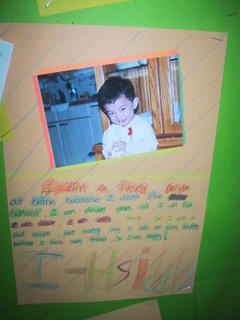One Tombon, One Product
 As usual, my students are teaching me more than I'm teaching them. Today, during a vocabulary lesson with my ESL 6th graders, I wrote Adjectives, Nouns, and Verbs on the board, handing a flash card to each student and instructing them to take the words to the board and tape them under the correct part of speech.
As usual, my students are teaching me more than I'm teaching them. Today, during a vocabulary lesson with my ESL 6th graders, I wrote Adjectives, Nouns, and Verbs on the board, handing a flash card to each student and instructing them to take the words to the board and tape them under the correct part of speech.The vocabulary words were from a story we read last week titled The Best School Year Ever, about a student who struggled with an assignment to think of a compliment for a classmate who was typically not very nice. So, the story contained vocabulary words that the ESL students didn't know: compliment, resourceful, cunning, optimism, etc.
Many of the students put words like optimism in the category of adjective and I was explaining how many words can be slightly changed and become different parts of speech. I used resourceful, as an example, and asked if they could make it a noun. One of the students said resource, but couldn't explain what that meant. I asked if they could name a resource in Thailand, something they could trade with other countries. One student said natural gas, another said oil, then rice, and yet another said furniture. Pea said, "One tombon, one product". I thought I was misunderstanding her English, which is not unusual, so I had her, as well as several others in the class, repeat it. I finally asked Pea to write it on the board. She did and proceeded to explain that a tombon is a Thai word meaning village. I finally understood! Each village was responsible for one product to share with the group, like a Communist society, one tombon, one product. The students were happy with their "lesson", as was I.
While reading an article titled An investigation into aspects of Thai culture and its impact on Thai students in an international school in Thailand in the Journal of Research in International Education, left on the lunch table in the teacher's lounge, I learned that although Thai students are friendly, sociable, and academically able, they tend to be passive, respond only to direct questioning, and are poor participants in class discussions, rarely putting their hands up to answer questions, despite knowing the answers. The journal went on to say that Thai parents believe they have no right to involve themselves in school business as teachers have high status and parents may lose face if they questions what the teacher is doing.
The research went on to say that in Thai culture, the teacher is representative of moral goodness who bestows the gift of knowledge on his/her pupils (I don't believe I can live up to that!). The teacher makes a considerable self-sacrifice for the good of the pupils, creating a moral debt. This debt is repaid by students being respectful and behaving appropriately. If everybody behaves accordingly, family, school, community, and society will be peaceful and free of trouble. Thai elementary school teach students to be a good subject, 'a child the nation desires', which suppresses initiative, self-responsibility, and individual maturation. Thai society values smooth interaction and conflict avoidance. There is a desire to please that results in giving evasive answers or outright lies when the truth would be uncomfortable. Even the Thai word for 'no', mai chai, seeks not to offend - its literal translation means 'not yes'.
Everyday is a new learning experience. One of my goals for the year is to find ways to modify classroom activities, taking into account that I'm teaching in a collectivist versus individualist society. People are the same all around the world, but there are definite cultural differences that, if known, make working together a lot easier.